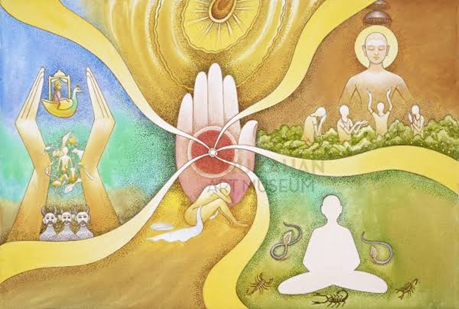Four Bhāvanās:
In Jainism there are four Bhāvanās or compassionate reflections which are sometimes referred as auxiliary Bhāvanās. Bhāvanā means noble and lofty thought which inspires a person to live a perfect life. It means contemplation.
Bhāvanās are interdependent. There are two sets of Bhāvanās depicted in the Jain tradition. One is that of consisting of twelve Bhāvanās and the other of four Bhāvanās. The first set is more towards internalization and conceived with a view to foster spirituality while the latter is about expanding our care and concern to the outer and surrounding world.
These four Bhāvanās can form important place in the workplace perception.
1.Maitrī:
The first bhāvanā is that of Maitrī i.e., friendship. Maitrī is all about acceptance, trust, support and mutual respect for each other.
There is little doubt that the competition challenges the person to perform better. But competition creates lot of stress in the minds as well as in the environment of the workplace. Friendship creates friendly atmosphere and people will be motivated to perform well.
Creating friendly environment is the most important challenge in the present workplace scenario. Friendship generates empathy and the person can identify and understand the issues from the standpoint of others. In fact, one person’s positive and friendly attitude can generate interesting and positive chain reactions.
Cultivation of friendly attitude can be gradual process. It must be accepted that it is a difficult process. Since our education system has been individualistic and competitive, we have been attuned to think on competitive lines. We have to work on this and put efforts.
The extension of friendship towards one’s own environment may give rise to eco-friendly attitude. Eco-friendly perception goes beyond utilitarian approach. The attitude of friendship begins from one’s own surrounding and then expands towards the entire world.
2.Pramoda:
Pramoda is the feeling of admiration. It stands for admiration when one becomes delighted at seeing the virtues of others.
Admiration generates positive vibrations. In fact, this is the best technique for consistent work performance. Fair work appreciation can result in better work outputs.
Admiration is not just important aspect of downward communication. It can become equally interesting dimension of the horizontal communication. If the employees appreciate and admire each other’s’ deserving actions, this can certainly generate greater job-satisfaction among the employees.
As the research on the organizational studies go on showing that it is not just money or luxuries that would result in better job performance or greater job satisfaction, rather the genuine words of appreciation can go long hand in increasing efficiency in organizations.
The admiration of qualities of the employees may be in a way bench marking of the performance in the institution.
The flow of admiration can be extended to the noble and worthy people of all fields and levels. This will give determination and strength to the deserving ones to go ahead on this path. The selfless and dedicated people will be encouraged to continue their journey.
There are so many mediocre and unworthy actions that are popularized in the contemporary society in the wake of media hype. This cycle can be countered by the admiration of deserving ones.
Again, this neither requires extra energy nor extra effort. This can be worked out as a part of our daily work schedule. Let happiness and virtue reign supreme in this world!
3.Karunā:
The third bhāvanā is that of karunā i.e., compassion. Compassion stands for the concern for the destitute and poor. One can see similarity and parallel in this bhāvanā and the concept of corporate social responsibility. When the things or actions are done with the compassionate approach, the outcomes are different.
Compassionate attitude encompasses the cross-sections of the society. The management of diversity at the workplace can be done through compassion. This bhāvanā implements a vision that contributes towards the promotion of brotherhood and betterment of mankind.
4.Mādhyastha:
The attitude of neutrality is another requirement in the workplace scenario. Of course, mādhyastha cannot be exercised or expressed to the fullest in the workplace. There are times where the person needs to take stand. But impartial attitude is required in the decision-making in the sense that all sides and parties are given fair consideration.
When the focus is on the best or best possible performance, it results in the improvement of quality and lesser stress levels. One should contemplate on mādhyastha bhāvanā which leads to feeling that ‘I did my best to resolve the situation.’
Putting together when we look at the four bhāvanās one can see the evolution of workplace spirituality. These can be incorporated in the workplace. Even if they have been originated from Jain background, they are beyond religion and secular.
Conclusion:
In short, one should stay in peace while living in worldly life by developing a friendship towards all living beings, admiring their success, holding their hands when they are in distress, and leaving them alone at times when they do not understand what is right or wrong. Be the change you want to be.




Very Nice
Thanks.
Very informative article…also you have well connected the ancient theory with the current scenario which is the need of the hour for the young generation.
Thanks.
Informative Ma’am
Thanks.
Very proper language Good Rendring I wish this should be sent to sone management guru
Yes People are working on it.
Nice article and easy to implement Jainism concept in professional life and also encourage to non-jains to follow… Keep sharing such articles!!!
Thanks.